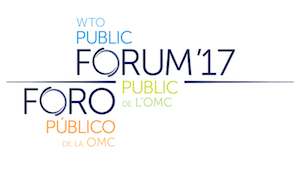Enabling e-commerce for MSMEs in developing countries: Using Estonian e-residency to access international markets
27 Sep 2017 15:30h - 17:00h
Event report
[Read more session reports from WTO Public Forum 2017]
Trading internationally can be daunting for micro, small and medium enterprises (MSMEs), especially in developing countries. This session addressed one possible solution to the challenges faced by MSMEs in international trade: Estonia’s e-Residency programme. Mr Alfredo Suescum, Ambassador of the Permanent Mission of Panama, session moderator, congratulated Estonia for ‘facing and embracing the challenges and opportunities in the electronic world’, and referred to the session on e-residency at last year’s public forum. Since 2016, e-residency has evolved and grown, and has provided innovative business solutions in different countries.
Ms Victoria Saue, Head of Legal and Compliance of e-Residency, introduced the concept and advantages of e-Residency, which provides everyone with an opportunity to run a global EU company fully online, from signing contracts to transmitting encrypted documents and conducting e-banking. At the moment, there are more than 24,000 e-Residents from 142 countries, and their biggest motivation is to conduct international business independent of their location. She also presented a pilot in India, which promotes women’s entrepreneurship by incorporating their businesses in the EU and providing support in the management of their companies. Connecting by Skype, Mr Arvind Kumar, a small business owner and e-resident from India, shared his experience with the e-residency programme in establishing his company that develops industrial mathematical models for process plants.
Ms Kadri Raig, Chief Marketing Officer, 1Office Group, presented some of the obstacles that many e-residents still face in doing international business. There are different laws in different countries, language barriers, necessary licences, tax treaties between countries, banking rules, accounting regulations, and many other things that need to be taken into consideration. While e-residency provides many important services for MSMEs, international business remains complex and can only be tackled with information and know-how. She then presented the ways in which 1Office helps entrepreneurs to do business abroad.
Mr Marcos Vaena, Chief of Enterprise Competitiveness, International Trade Centre (ITC), presented the findings of ITC’s recently published e-commerce survey, which identifies the bottlenecks encountered by enterprises when engaging in cross-border e-commerce, and aims to bring this business perspective to the policy level. The obstacles were mapped according to four stages of the e-commerce process: opening an online business, international e-payments, cross-border deliveries, and aftersales. Many of the challenges were found in a lack of understanding among producers and a lack of trust among consumers. Nevertheless, the survey found that e-commerce opens the door to international trade, and is even gender-neutral: the share of women-owned online firms is double compared to traditional offline trade. Vaena also presented some of the ITC’s E-Solutions.
The discussion focused on different aspects of the e-Residency programme, including questions of costs, security, trust, and taxes. Other countries, such as the Netherlands, Latvia, Lithuania, and Singapore have started to experiment with similar programmes. In their closing remarks, the speakers highlighted the continued need for know-how and knowledge on international trade rules, which cannot be replaced by technology; the importance of public-private-partnerships and a positive approach to innovation; and the hope that more countries and MSMEs can benefit from solutions like e-residency to trade across borders and become more competitive.
by Barbara Rosen Jacobson
Related topics
Related event

